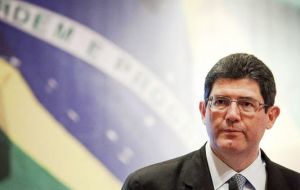MercoPress. South Atlantic News Agency
Despite a contracting economy Brazil increases basic interest rate to 13.75%
 Minister Levy has pledged to deliver a primary surplus equal to 1.1% of GDP in 2015, a substantial improvement from last year's deficit of 0.6% of GDP
Minister Levy has pledged to deliver a primary surplus equal to 1.1% of GDP in 2015, a substantial improvement from last year's deficit of 0.6% of GDP Brazil raised interest rates to the highest levels in more than six years on Wednesday, extending a tightening campaign and leaving the door open for more hikes despite concerns that steep borrowing costs could deepen an expected economic recession.
The central bank's monetary policy committee, known as Copom, decided unanimously to hike its benchmark Selic rate by 50 basis points to 13.75% as expected by an overwhelming majority of market players.
The bank kept the wording of the announcement unchanged from the previous meeting, suggesting its monetary policy committee members want to leave open the option for more rate increases.
The move comes a day after the country's statistics agency IBGE said that industrial production declined 7.6% in April from a year earlier, and less than a week after it reported Brazil's gross domestic product contracted 1.6% in the first quarter from the same period last year.
Economists surveyed by the central bank expect GDP to shrink 1.27% in 2015. In the same survey, forecasts are for a 12-month inflation rate of 8.3% at the end of this year.
The central bank's inflation target is 4.5%, with a tolerance range of two percentage points in either direction. The 12-month rate has been above the center of the range for years, and will likely finish 2015 above the ceiling for the first time since 2004, when it hit 7.6%.
The 13.75% is the highest Selic rate since January 2009. Leading one of the world's boldest rate-hiking cycles to tame inflation running at an 11-year high, the central bank is succeeding in regaining credibility with investors but risks damaging an economy expected to suffer its worst recession in 25 years.
The bank may further increase rates to make good on its promise to bring inflation back to the 4.5% of the official target range by late 2016.
Finance Minister Joaquim Levy has pledged to deliver a primary surplus, or government savings before interest payments, equal to 1.1% of GDP in 2015--a substantial improvement from last year's deficit of 0.6% of GDP.
President Dilma Rousseff and Mr. Levy have been trying to demonstrate support for the central bank's anti-inflation efforts in an attempt to help drive down forecasts that now put 2016 annual inflation at 5.5%, and not reaching 4.5% before 2019.
The relatively high forecasts are the result of policy makers' dented credibility, critics say, and now Brazil's central bank needs to go the extra mile to convince markets that it won't budge in the fight against inflation.




Top Comments
Disclaimer & comment rules-

-

-

Read all commentsRaising interest rates during a recession.
Jun 04th, 2015 - 11:24 am 0Oh damn!!!!!
Inflation. They will reduce economic activity until only the competitive survive. Then they decreased interest rates to increase competitiveness without inflation.
Jun 04th, 2015 - 01:34 pm 0What a terrific idea! Force several businesses into bankrupsy and the large companies become monopolies.
Jun 04th, 2015 - 06:22 pm 0Commenting for this story is now closed.
If you have a Facebook account, become a fan and comment on our Facebook Page!